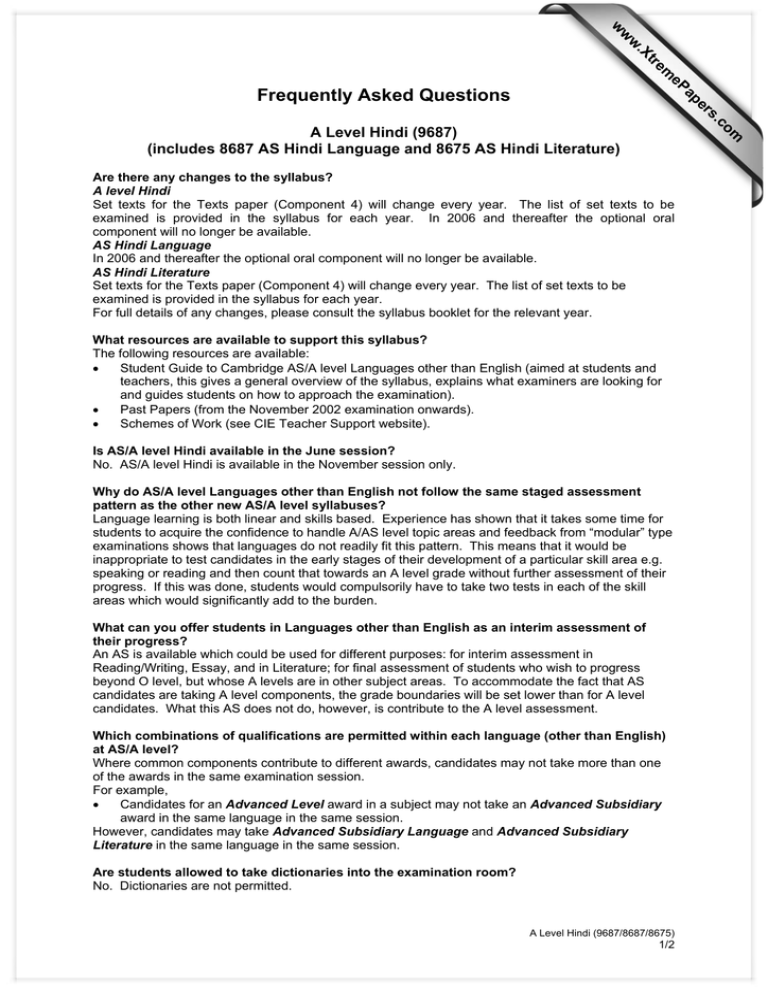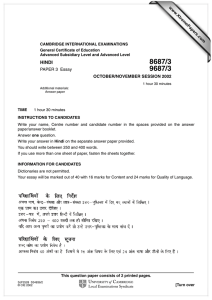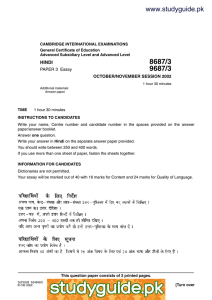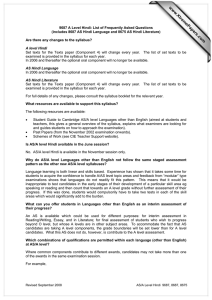Frequently Asked Questions
advertisement

w w ap eP m e tr .X w Frequently Asked Questions om .c s er A Level Hindi (9687) (includes 8687 AS Hindi Language and 8675 AS Hindi Literature) Are there any changes to the syllabus? A level Hindi Set texts for the Texts paper (Component 4) will change every year. The list of set texts to be examined is provided in the syllabus for each year. In 2006 and thereafter the optional oral component will no longer be available. AS Hindi Language In 2006 and thereafter the optional oral component will no longer be available. AS Hindi Literature Set texts for the Texts paper (Component 4) will change every year. The list of set texts to be examined is provided in the syllabus for each year. For full details of any changes, please consult the syllabus booklet for the relevant year. What resources are available to support this syllabus? The following resources are available: Student Guide to Cambridge AS/A level Languages other than English (aimed at students and • teachers, this gives a general overview of the syllabus, explains what examiners are looking for and guides students on how to approach the examination). • Past Papers (from the November 2002 examination onwards). • Schemes of Work (see CIE Teacher Support website). Is AS/A level Hindi available in the June session? No. AS/A level Hindi is available in the November session only. Why do AS/A level Languages other than English not follow the same staged assessment pattern as the other new AS/A level syllabuses? Language learning is both linear and skills based. Experience has shown that it takes some time for students to acquire the confidence to handle A/AS level topic areas and feedback from “modular” type examinations shows that languages do not readily fit this pattern. This means that it would be inappropriate to test candidates in the early stages of their development of a particular skill area e.g. speaking or reading and then count that towards an A level grade without further assessment of their progress. If this was done, students would compulsorily have to take two tests in each of the skill areas which would significantly add to the burden. What can you offer students in Languages other than English as an interim assessment of their progress? An AS is available which could be used for different purposes: for interim assessment in Reading/Writing, Essay, and in Literature; for final assessment of students who wish to progress beyond O level, but whose A levels are in other subject areas. To accommodate the fact that AS candidates are taking A level components, the grade boundaries will be set lower than for A level candidates. What this AS does not do, however, is contribute to the A level assessment. Which combinations of qualifications are permitted within each language (other than English) at AS/A level? Where common components contribute to different awards, candidates may not take more than one of the awards in the same examination session. For example, • Candidates for an Advanced Level award in a subject may not take an Advanced Subsidiary award in the same language in the same session. However, candidates may take Advanced Subsidiary Language and Advanced Subsidiary Literature in the same language in the same session. Are students allowed to take dictionaries into the examination room? No. Dictionaries are not permitted. A Level Hindi (9687/8687/8675) 1/2 If my candidate is ungraded at A level, is there a possibility of a compensatory AS? Yes, all candidates in this position will then be regraded as AS candidates using the components which are common to both levels and will be awarded an AS grade. Can I teach AS and A level candidates in the same classroom? Yes, the overlap between the components for AS and A level is such that most activities will be suitable for both groups. I've got a great idea for a set text I’d like to see on the syllabus, and I think it would be very popular with other teachers too. What should I do? Please write to the Product Manager for A level Hindi. We welcome suggestions from our Centres for set texts in future sessions. Can students take their set texts into the examination for Paper 4? Yes, unannotated set texts may be taken into the examination room for Paper 4. What are the rules about candidates annotating their set texts for Paper 4? Any copies of set texts that candidates take into the examination room must not have been written on or marked in any way. Where Editor’s Notes appear at the beginning or end of a text, these must be separated off (e.g. with an elastic band) for the duration of the examination. Is it a requirement to use particular editions of the set texts? Is it a problem if my candidates are studying from different editions? If a particular edition is not specified in the syllabus booklet, students can use any edition (so long as it is the full text). Are candidates who prepare more than the minimum required set texts at an advantage in the exam room? Only in the sense that they potentially will have more choice of questions. In reality, demands on classroom time mean that it is unlikely that many candidates will have prepared more than 3 texts. What do you think of the educational benefits of doing the AS Literature with students of O level age? Good idea – we have had feedback from a number of Centres who feel that this is something which could be used for O level, First, or very fluent Foreign Language students to give curriculum and cultural enrichment. A Level Hindi (9687/8687/8675) 2/2


